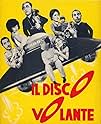Añade un argumento en tu idiomaAn exasperated police inspector receives different eyewitness accounts surrounding a downed saucer and its female occupant.An exasperated police inspector receives different eyewitness accounts surrounding a downed saucer and its female occupant.An exasperated police inspector receives different eyewitness accounts surrounding a downed saucer and its female occupant.
Lello Bersani
- Reporter
- (sin acreditar)
Erika Blanc
- Extra
- (sin acreditar)
Carlo Mazzarella
- Reporter
- (sin acreditar)
Piero Morgia
- Un Appuntato
- (sin acreditar)
Graziella Polesinanti
- Contessa Crosara
- (sin acreditar)
Argumento
¿Sabías que...?
- CuriosidadesErika Blanc's debut.
- Banda sonoraBALLANDO CON TE
Written by Gorni Kramer (as Kramer) and Vito Pallavicini (as Pallavicini)
Performed by Paolo Occhipinti (as John Foster)
Ed. Style
Reseña destacada
Despite thinking it is unnecessary, the police chief dutifully complies when he is ordered by a higher-up to interview everyone who has claimed to have seen the flying saucer. What follows provides insight into human motivation and human nature, and is also hysterically funny.
The story uses the plot device of a supposedly non-existent object, the flying saucer, like a psycho therapist uses a rorschach inkblot. But of course, while rorschach inkblots are real printed copies of real inkblots, there is no such thing as a flying saucer. Of course. Or is there? Well, what is it then that is stimulating people's imaginations, revealing what is on their mind, revealing what they care about, showing us "who they are," and where they are situated in a small town's class hierarchy in 1964 Italy? Such things are revealed by what it is that they tell us they have seen, and by the way that they tell us that. Seem to me that what they have seen is not as important to the story as what they say about what they've seen. I think that what matters is what we learn about the *witnesses* to the flying saucer, if it exists, is what we learn about the people, from their testimony.
One reviewer called this movie "light fare." It is not what I would call light fare. Perhaps I might call it deeply penetrating satire. At any rate, I found every minute of this movie to be a delight. One of my favorite movies of all times.
Now, is there actually a flying saucer, or not? Watch the movie and find out.
The story uses the plot device of a supposedly non-existent object, the flying saucer, like a psycho therapist uses a rorschach inkblot. But of course, while rorschach inkblots are real printed copies of real inkblots, there is no such thing as a flying saucer. Of course. Or is there? Well, what is it then that is stimulating people's imaginations, revealing what is on their mind, revealing what they care about, showing us "who they are," and where they are situated in a small town's class hierarchy in 1964 Italy? Such things are revealed by what it is that they tell us they have seen, and by the way that they tell us that. Seem to me that what they have seen is not as important to the story as what they say about what they've seen. I think that what matters is what we learn about the *witnesses* to the flying saucer, if it exists, is what we learn about the people, from their testimony.
One reviewer called this movie "light fare." It is not what I would call light fare. Perhaps I might call it deeply penetrating satire. At any rate, I found every minute of this movie to be a delight. One of my favorite movies of all times.
Now, is there actually a flying saucer, or not? Watch the movie and find out.
- soilmanted
- 14 dic 2015
- Enlace permanente
Selecciones populares
Inicia sesión para calificar y añadir a tu lista para recibir recomendaciones personalizadas
Detalles
- Duración1 hora 34 minutos
- Color
Contribuir a esta página
Sugerir un cambio o añadir el contenido que falta

Principal laguna de datos
By what name was Il disco volante (1964) officially released in Canada in English?
Responde














